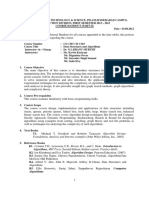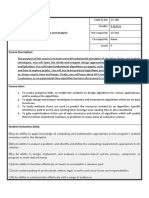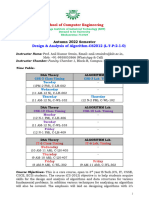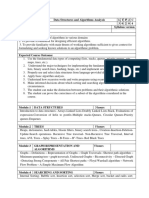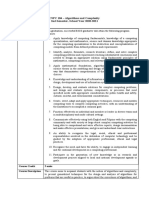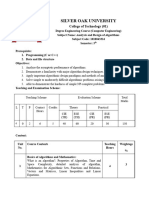Algorithms Course Outline
Uploaded by
l200908Algorithms Course Outline
Uploaded by
l200908NATIONAL UNIVERSITY
of Computer & Emerging Sciences, Lahore
Department of Computer Science
CS302 – Design and Analysis of Algorithms
FALL 2023
Instructor Name: M Usama Hassan Alvi
Email address: usama.hassan@lhr.nu.edu.pk
Office Location/Number: Exam hall-129
Office Hours: Mon to Friday: 2:00 PM till 4:00 PM
Course Information
Program: BS (CS, DS, Robotics) Credit Hours: 3 Type: Core
Pre-requisites: Data Structures
Class Meeting Time: BCS-5E Tuesday, Thursday 10:00 AM to 11:20 AM
Class Venue: BCS-5E E&M - 16
Class Meeting Time: BDS-5C Monday, Wednesday 11:30 AM to 1:00 PM
Class Venue: BDS-5C CS - 11
Class Meeting Time: BSR-5A Monday, Wednesday 10:00 AM to 11:20 AM
Class Venue: BSR-5A CS - 11
Course Description:
The objective of this course is not to fill your brains with every algorithm that you would ever need.
One of the aims of this course is to teach you to reason about algorithms and describe them. In
addition, many known algorithms to solve known problems will be taught. At the end of the course,
you should be able to choose an appropriate algorithm from a set of algorithms for a given problem.
Course Learning Outcomes (CLOs):
1. Design algorithms using different algorithms design techniques
i.e., Brute Force, Divide and Conquer, Dynamic Programming, Greedy
Algorithms and apply them to solve problems in the domain of the
program
2. Analyze the time and space complexity of different algorithms by
using standard asymptotic notations for recursive and non-recursive
algorithms
3. Evaluate the correctness of algorithms by using theorem proving
or executing test cases
Course Textbook
Introduction to Algorithms by Cormen, Leiserson, Rivest, and Stein, 3rd Ed., MIT Press, 2001.
Additional references and books related to the course:
Jon Kleinberg, Éva Tardos, Algorithm Design, Pearson/Addison-Wesley
Sanjoy Dasgupta, Christos Papadimitriou, Umesh Vazirani, Algorithms, McGraw-Hill Education
Algorithms in C++ by Robert Sedgewick, Addison-Wesley, 1992.
Data Structures and Algorithms by Aho, Hopcroft, and Ullman.
Weekly Schedule
Lectures Description Chapters of Text
Week -1 The role of algorithms in computers, Asymptotic 1, 2, 3
functions and notations (Big-oh, big-omega, big-
theta) best and worst case time complexity
Week – 2, 3, 4 Divide and Conquer (maximum subarray sum, 2, 3, 6
counting inversions, quicksort, merge sort)
+ Solving recurrences
Week – 5 Lower bound for comparison based sorting, Sorting 8
in linear time: Count Sort, radix sort
Midterm – I
Week – 6,7 Dynamic Programming ( maximum subarray, rod 15
cutting, longest common subsequence, binary
knapsack)
Week – 8, 9 Greedy Algorithms (Activity selection, fractional 16
knapsack and Huffman codes)
Week – 10 Introduction to graphs (revision of BFS, DFS) and 22
their application (topological sort, strongly
connected components)
Midterm – II
Week – 11 Minimum Spanning Trees (MST)(Prim's Algorithm 23
and Kruskal's Algorithm)
Week – 12, 13 Shortest Path Algorithms (Dijkstra's Algorithm, 24
Bellman-Ford and Floyd Warshall Algorithm
Week 14 Approximation Algorithms/ NP Hard Problems
Final Exam Comprehensive
Grading Criteria
1. Quizzes and Assignments (25%)
2. Midterm Exams (30%)
3. Final Exam (45%)
Grading Policy
Absolute Grading
Course Policies
1. Quizzes will be announced. (There might be surprise quizzes)
2. No makeup for missed quizzes and assignments.
Academic Integrity: All work MUST be done individually. Any copying of work from other person(s)
or source(s) (e.g., the Internet) will automatically result in at least an F grade in the course. It does
not matter whether the copying is done in an assignment, quiz, midterm exam, or final exam, it will
be considered equally significant.
You might also like
- Course Design and Analysis of AlgorithmsNo ratings yetCourse Design and Analysis of Algorithms26 pages
- CS 510-Design and Analysis of Algorithms-Imdad Ullah KhanNo ratings yetCS 510-Design and Analysis of Algorithms-Imdad Ullah Khan3 pages
- Course Outline - DAA - CO@2023 dt-2024-02-22 20-38-49No ratings yetCourse Outline - DAA - CO@2023 dt-2024-02-22 20-38-493 pages
- 2. Course Information Sheet (Theory) AlgoNo ratings yet2. Course Information Sheet (Theory) Algo8 pages
- CS 310-Algorithms-Imdad Ullah Khan-Arif ZamanNo ratings yetCS 310-Algorithms-Imdad Ullah Khan-Arif Zaman3 pages
- Cse3004 Design-Analysis-Of-Algorithm LT 1.0 1 Cse3004No ratings yetCse3004 Design-Analysis-Of-Algorithm LT 1.0 1 Cse30042 pages
- L7 - CS305 - Algorithm Design and AnalysisNo ratings yetL7 - CS305 - Algorithm Design and Analysis4 pages
- CS302 Design and Analysis of Algorithm: Week-1aNo ratings yetCS302 Design and Analysis of Algorithm: Week-1a39 pages
- Syllabus - Analysis and Design of AlgorithmNo ratings yetSyllabus - Analysis and Design of Algorithm2 pages
- CSE 5010 - Data Structures and Algorithms AnalysisNo ratings yetCSE 5010 - Data Structures and Algorithms Analysis3 pages
- Design and Analysis of Algorithms Prof. Madhavan Mukund Chennai Mathematical Institute Week - 01 Module - 01 Lecture - 01No ratings yetDesign and Analysis of Algorithms Prof. Madhavan Mukund Chennai Mathematical Institute Week - 01 Module - 01 Lecture - 018 pages
- CSPC 104 - Algorithms and Complexity 2nd Semester, School Year 2020-2021100% (1)CSPC 104 - Algorithms and Complexity 2nd Semester, School Year 2020-20213 pages
- Final_Autumn 2024 CS30001 DAA Theory Complete Lesson Plan.docxNo ratings yetFinal_Autumn 2024 CS30001 DAA Theory Complete Lesson Plan.docx5 pages
- BCA V and VI Sem Syllabus-As per UOM_Revised_08_04_24No ratings yetBCA V and VI Sem Syllabus-As per UOM_Revised_08_04_2430 pages
- CSC 201-Design and Analysis of Algorithms-Fall2016No ratings yetCSC 201-Design and Analysis of Algorithms-Fall20165 pages
- Autumn 2024 CS30001 DAA Complete Lesson Plan - Section CSE-XXNo ratings yetAutumn 2024 CS30001 DAA Complete Lesson Plan - Section CSE-XX6 pages
- Mastering Algorithms for Competitive Programming: Unlock the Secrets of Expert-Level SkillsFrom EverandMastering Algorithms for Competitive Programming: Unlock the Secrets of Expert-Level SkillsNo ratings yet
- Chapter 3 - Solving Problems by Searching ConciseNo ratings yetChapter 3 - Solving Problems by Searching Concise67 pages
- Cubic Spline Solutions of The Ninth Order Linear and Non-Linear Boundary Value ProblemsNo ratings yetCubic Spline Solutions of The Ninth Order Linear and Non-Linear Boundary Value Problems16 pages
- ME685A: Applied Numerical Methods: ST NDNo ratings yetME685A: Applied Numerical Methods: ST ND3 pages
- WORKSHEET (SESSION 2022 - 2023) Grade 10 Subject - Mathematics Polynomials S.NO. Questions Section A (1 Mark Questions)100% (1)WORKSHEET (SESSION 2022 - 2023) Grade 10 Subject - Mathematics Polynomials S.NO. Questions Section A (1 Mark Questions)2 pages
- Finite Element Analysis 3+1: MEC606 Common With Mechanical Engineering ObjectivesNo ratings yetFinite Element Analysis 3+1: MEC606 Common With Mechanical Engineering Objectives1 page
- Design and Analysis of Algorithms: Unit - VNo ratings yetDesign and Analysis of Algorithms: Unit - V31 pages
- M Equations in N Unknowns: 1.2 Gaussian Elimination P. DanzigerNo ratings yetM Equations in N Unknowns: 1.2 Gaussian Elimination P. Danziger22 pages
- Sample Question Paper 2024-25 Practice Test 2No ratings yetSample Question Paper 2024-25 Practice Test 22 pages
- Python Lab Programs 1. To Write A Python Program To Find GCD of Two NumbersNo ratings yetPython Lab Programs 1. To Write A Python Program To Find GCD of Two Numbers12 pages












